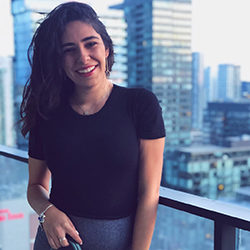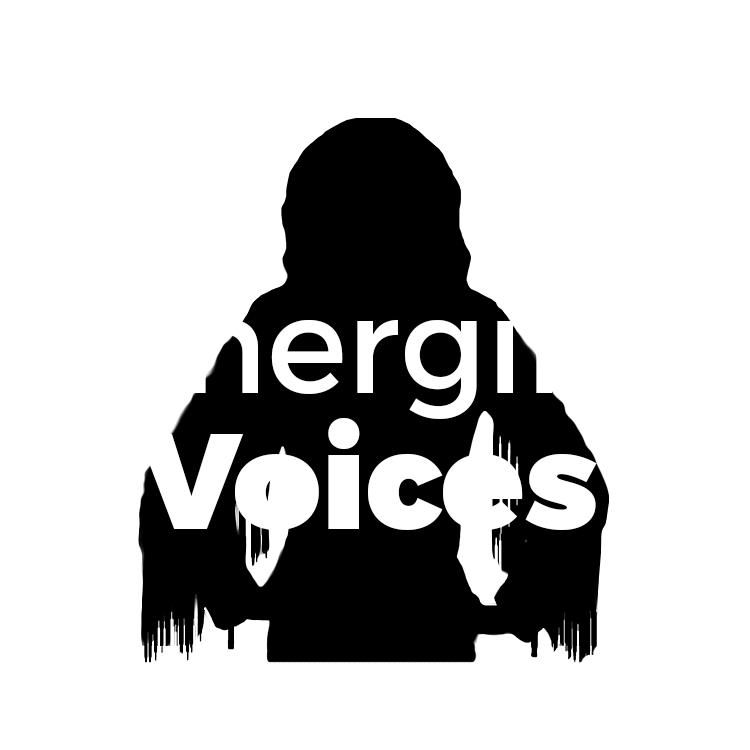Amy Hull is an artist who loves to dance. She was born in Newfoundland into a family with Mi’kmaq and Inuit roots and now identifies as a “Torontomiut”. Amy also plays a big part in her community: She’s the Vice President of the Aboriginal Students Association and Aboriginal Student Success & Transition Coordinator at York University, the Secretary of the National Urban Inuit Youth Council, and a Toronto Inuit Youth Council member.
Sara Mustafa is a Palestinian-Canadian graphic designer and a tireless advocate for the Palestinian movement. Her father is from the city of Qalqilya in the West Bank and her mother is from Nablus. Sara was born in Montreal and grew up in Dubai. She moved to Canada in 2013, where she studied graphic design at York University, and now digital marketing management at the University of Toronto. She has never been to Palestine, but has numerous family members currently being detained by the Israeli government.
Sara and Amy meet on a sunny afternoon in the broadcast studios in Ryerson University; Sara on her way back from a marketing class and Amy in between meetings at York. It’s the first time they’ve met, and they’re excited to exchange thoughts on what seem to be common experiences around their (wildly different) heritage.
The two hit it off right away. Dipping into her paint, Sara laughs as Amy tries to avoid all the lights and cameras on her way in (“they’re intimidating!” she cries). They immediately start discussing their experiences being university students in Toronto. And as they talk, they paint…
SARA: Having lived here for nearly five years I haven’t had the opportunity to discuss the impact of colonialism with an Indigenous student. Has your family been impacted by settler colonialism?
AMY: My mother is from Grand Falls-Windsor and my father is from Daniel’s Harbour [a community of about 250 people]. But my mother Mother is Mi’kmaq, and my father is also Mi’kmaq, but is considered Inuk. He doesn’t really talk about it because he just wants us to be white.
When I was growing up I wasn’t allowed to identify as Indigenous – only as a white person. But I wasn’t a white person. I mean… I wasn’t allowed to [identify as Indigenous] until my mother applied for our Indian status. Then she said I’m only Mi’kmaq. But I told her ‘no my father is Inuk’. I told her if she didn’t want me to be Inuk then she shouldn’t have married and had babies with an Inuk, but she was very adamant that I wasn’t an Inuk. My father really just wanted me to pretend to be a white person.
SARA: Why were you not allowed to be Indigenous?
AMY: My parents don’t think it’s okay to be Indigenous. My mother’s side are Mi’kmaq but they are not originally from Newfoundland. They just moved in there during the scalping proclamation in the 1700 [In a 1749 proclamation, Halifax founder Edward Cornwallis offered state money for the scalps of Mi’kmaq men, women and children]. We had to flee because we were going to get killed and have our scalps turned in for money – so we all went to Newfoundland. When my father lived in Labrador there were residential schools. There was also no work or anything except for going away to war but then you’d go back and get no work anyway so they kept moving south and south and south of Labrador, until eventually they settled in the northern part of the peninsula in Labrador. So, I don’t have a community that I have a connection to because that was like seven generations ago… that’s about it. I have no community.
I felt like the carpet was being pulled out from under my feet and there was no one to catch me.
— Amy Hull
SARA: I have always identified as Palestinian even though I have never really been there. The closest I’ve been to Palestine is Jordan. People have told me it’s not your home – it’s your parents home… but it’s odd because I grew up Palestinian. I grew up with that culture even without being in Palestine. I lived in Dubai but I do not call Dubai my home. My grandparents from my father’s side live in Palestine and a lot of my mother’s side were there too.
To give you perspective, my mother has only met my grandfather from my dad’s side once and that’s when they got married. It was very difficult to get into Palestine for her from Dubai because the Palestinian-Israeli border do not easily allow for past families to re-enter.
I haven’t been to Palestine myself because my father’s identity was stripped away when he tried to get into Palestine after studying in Jordan for university. They [the Israeli authorities] just stripped him of his identity and told him that he hadn’t been there for a while so he couldn’t come back.
AMY: That’s some relatable s***.
SARA: I haven’t gone, because it’s a risky process for the whole family.
AMY: I feel like I’ve been disowned by my own community. My grandfather fought for a long time to have recognition as a Mi’kMaq person in Newfoundland and then he died. But this past year the government decided to revoke our Indian status [meaning that Amy has lost her Indigenous rights in Canada]. This was only possible because the chief appeal master agreed to it. Everyone turned their backs on me and my family when we were an instrumental part to bringing that recognition to that community. I felt like the carpet was being pulled out from under my feet and there was no one to catch me.”
“I find it difficult to know what to do. The government didn’t give us any support. The only support I got was the suicide hotline. That’s what I got from Carolyn Bennett, the Minister of Crown-Indigenous Relations and Northern Affairs, when I talked to her about it. The only thing she gave me was the suicide hotline [Ottawa provides Indigenous youths with a suicide hotline to get immediate emergency telephone counselling].
I feel like I’ve been thrown out with the trash and I’m not a worthy part of it [the Indigenous community] anymore.
SARA: It is a loss of identity because they just cut the line right there. But it’s also made me more protective of it. It’s my grandparents identity, my parents identity, so it’s still my identity.

Anger and rage is represented through the blackness in Sara’s painting. “But everyone is still smiling,” she says. “So there is light in there.” (Mira Nabulsi)

Amy’s painting represents both of their hands with the Palestinian and Mi’kMaq flag. The seven strawberries represent healing and forgiveness. “The blue represents the clear skies that are coming for both of us,” she says. (Mira Nabulsi)
To tell you the truth, I didn’t really feel displaced until I was older, until I realized what the conflict really was. As a child I just saw the news and would talk to my parents about it. They would tell me: “One day we will go back and you’ll see it, you’ll understand it.” So I felt like I do belong in this place. And then I realized it was not just me that left, but everybody else, even those that actually lived there. It all clicked in my head.
AMY: I don’t know where my original community would have been if my family did not flee to Newfoundland. And neither do my parents know… There is no community because we made up our own communities when we got to the new place, and then all of a sudden we’re not allowed to be a part of any of them because I don’t count.
SARA: It’s a fear of mine to go [to Palestine] and feel like I don’t belong there, even though it’s the culture I grew up in.
AMY: I feel like we’ve known each other for a long time…
*This conversation has been condensed for length.

Mira Nabulsi is a storyteller at heart. Her passion for journalism began in 2013 in South Africa, when she documented the disappearance of two of her favourite animals – the elephant and the rhino. She is currently interning at the Discovery Channel and lives for new adventures, discoveries, wildlife and technology. Her work can be viewed at www.miranabulsi.com

